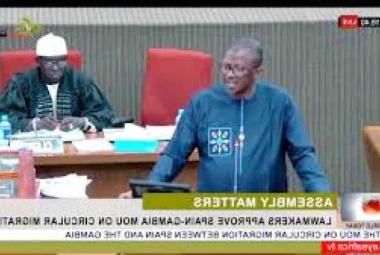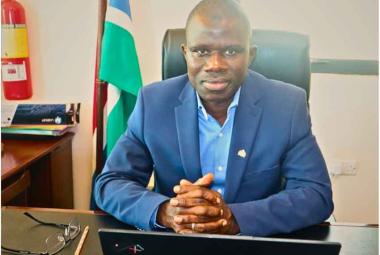By Kumba Leigh
The Deputy Permanent Secretary at the Ministry of Trade, Industry, Regional Integration, and Employment (MoTIE), Mr Abdoulie Jammeh, has detailed reasons for the delay in implementation of the Africa Free Trade Area (AFCFTA).
The AfCFTA is one of the flagship projects of Agenda 2063: The Africa We Want, the African Union’s long-term development strategy for transforming the continent into a global powerhouse. It is the world’s largest free trade area, bringing together the 55 countries of the African Union (AU) including The Gambia, and eight (8) Regional Economic Communities (RECs). The overall mandate of the AfCFTA is to create a single continental market with a population of about 1.3 billion people and a combined GDP of approximately US$ 3.4 trillion.
In this interview, Mr Jammeh highlighted the challenge of consensus building among the member states for the African products, as well as weak capacity on the part of some countries.
However, he informed that almost 90% of the AfCFTA tariff line has been agreed on, although a handful is yet to be approved. “There is the need for a rule for protection of origin, and the Guided Trade Initiative (GTI), an established trade initiative by AfCFTA meant to fast-track the AfCFTA implementation, and to make sure governments facilitate businesses under the trade agreement”.
Mr Jammeh explained that before trade starts there has to be a commitment gazetted on liberalisation of sensitive products including goods of origin, “so that people know at national level what their government is working on”. The rules of origin, he further explained, are legal instruments that help facilitate the trade and the benefits of preferences, transparency in businesses, and determine the legibility for preferential treatment.
Ousman Bojang, Director of Trade at the Ministry of Trade, Industry, Regional Integration and Employment, delved into the protocols within AfCFTA. He mentioned the Dispute Settlement Mechanism (DSM), which serves as a regulatory body or punishment for non-compliance on any member state that violates the rules.
About the AfCFTA commitments, Bojang revealed that 48 countries have ratified the document and submitted their documents, while six countries signed, but are yet to ratify, and they include Benin, Libya, Madagascar, Somalia, South Sudan, and Sudan.
He said there is no start-up trading of AfCFTA, since its ratification, because it was just an agreement, but affirmed that the Guided Trading Initiative is established to fast-track the process of implementation.
Mr Bojang further explained that incorporated in the AfCFTA are: protocol in trading services, protocol in goods, protocol in dispute settlement, competition property, intellectual property, investment, youths, women in trade, and digital trade.
He went further to highlight the liberation of AfCFTA tariffs on goods, noting that 90% of non-sensitive products will be liberalised, “which means 90% of the AfCFTA non-sensitive products tariffs will be eliminated”.
The Director however clarified that tariffs will not be eliminated on all products, because elimination depends on how less sensitive a product is on the economy. He however expressed hope that the 3% sensitive products whose tariffs cannot be liberalised now may be liberalised in the future through a process called ‘Progressive Liberalisation’.







